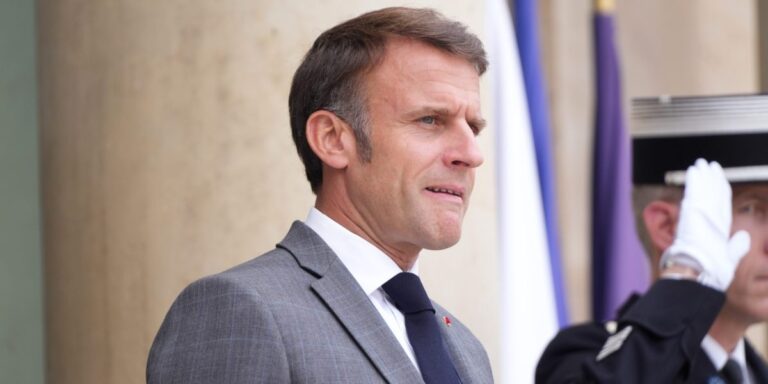
France is heading toward political instability after a left-wing coalition won a surprise victory in Sunday’s legislative elections, leaving no party able to claim the majority needed to govern.
New Popular The Front, which includes the Socialists and the far-left France Insoumise, is expected to win between 171 and 205 seats in the National Assembly. Marine Le Pen’s National Rally, which polls showed last week was the most popular party, is expected to come in third, with between 130 and 152 seats, while President Emmanuel Macron’s centrist alliance is expected to come in second, with 152 to 180 seats.
If all three groups fail to reach the 289 votes needed for an absolute majority in the 577-seat lower house, it is unclear how the country, which has no tradition of coalitions, will form a government capable of passing laws.
French Prime Minister Gabriel Attal has announced that he will present his resignation to Macron on Monday, which would begin the process of forming a new government.
The euro fell in early trading as investors digested a result that few had anticipated and which brought to the forefront concerns about France’s budget problems, given the parties’ commitment to a major increase in public spending.
According to the Montaigne Institute, the New Popular Front’s campaign commitments would require nearly €179 billion in additional funds per year. The far-right National Rally’s plans would cost around €71 billion, while Macron’s party and its allies would incur additional spending of nearly €21 billion.
Le Pen put a positive spin on the results, noting that the National Rally, which had 89 seats in the previous legislature, is on track to win the most seats of any party.
“The tide is rising,” Le Pen said. “It’s not high enough this time, but it’s rising nonetheless.”
The unexpected result means that no alliance has the numbers to govern with an absolute majority, fragmenting parliament into three separate groups with divergent agendas. Macron will wait for the new configuration of the National Assembly before making further decisions on the appointment of the next prime minister, according to a statement from an Elysée official.
France now faces two options, both of which have little precedent in the history of the modern Republic. Macron could try to assemble a coalition of willing but not always like-minded parties, but that would require the New Popular Front to break up and reconfigure itself behind the president, without its most radical elements.
Macron could also appoint a technocratic government that could bridge the gap between the two countries during this period of political turbulence. In both cases, the government will likely be weakened, have difficulty passing meaningful legislation, and have less influence on the international stage.
“The absence of a majority and the absence of a government expose France and the French people to a terrible danger,” warned Macron’s first head of government, Edouard Philippe, on Sunday evening. “The central political forces now have a responsibility that they cannot shirk: they must work for an agreement without dishonor that will stabilize the political situation.”
Jean-Luc Mélenchon, the leader of La France Insoumise, told supporters on Sunday that his New Popular Front would implement its program in its entirety and that it would refuse to make a deal with Macron. But Socialist leader Olivier Faure took a more conciliatory stance, saying it was the party’s job to “find a way” to meet the needs and demands of the French people.
French assets fell in the days after Macron announced early elections four weeks ago, but rebounded late last week as traders began to rule out an outright majority for Le Pen’s far-right party and accept the prospect of a paralyzed government in which neither the right nor the left would have unchecked power.
While a lower-than-expected seat tally for Le Pen’s party and an increase for Macron’s bloc came as a relief to some traders, the left-wing bloc’s victory is likely to hurt French assets in the coming weeks.
For Vincent Juvyns, global markets strategist at JPMorgan Asset Management, this could be reflected in the gap between French and German bond yields, which he sees widening.
“The European Commission and the rating agencies are expecting budget cuts of €20 billion to €30 billion, but the government will actually have to deal with a party that wants to increase spending by €120 billion,” Juvyns said. “This could create tensions in the markets in the coming weeks. Markets could demand a higher spread until the new government clarifies its budgetary position.”
Sunday’s projections provide some vindication for Emmanuel Macron’s decision to dissolve parliament after Marine Le Pen’s party’s landslide defeat last month. He was widely criticized for the move after his party finished third in the first round of voting last week, in which Le Pen took the lead.
Last week, there was a frantic effort to activate the Republican Front, a mechanism by which the major parties strategically withdraw candidates from certain constituencies to bolster votes against the National Rally. Macron’s party withdrew 76 candidates from runoffs where they had little chance of winning, in order to avoid splitting the anti-Le Pen vote. The New Popular Front withdrew 130.
The president of the National Rally, Jordan Bardella, criticized this strategy, believing that the approach orchestrated by the Elysée “is not doomed to disappear.”
Antonio Barroso, Teneo’s deputy research director, wrote in a note that forming a new government would be complicated and could take a long time.
“This indecision poses a risk to the country that no one should underestimate,” Philippe said. “Our country’s credibility could be undermined, just as its credit could be ruined.”


